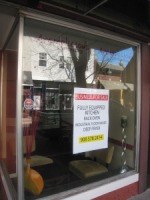Years ago, the Redevelopment Agency agreed to sell the former Kelly’s Pub on the condition that the property at the corner of Irving Street and Seminary Avenue be turned into a jazz club and restaurant.
 Serious financial issues have plagued the proposed KC Jazz Club to the extent that developers would like to explore selling the property as a simple tavern — only they would need the agency’s approval first. In a Sept. 19 letter to the Redevelopment Agency, Union-based attorney Ronald Esposito, representing E.T. Building, LLC, asks for a meeting to discuss issues in hopes of resolving “what appears to be a very serious financial problem.”
Serious financial issues have plagued the proposed KC Jazz Club to the extent that developers would like to explore selling the property as a simple tavern — only they would need the agency’s approval first. In a Sept. 19 letter to the Redevelopment Agency, Union-based attorney Ronald Esposito, representing E.T. Building, LLC, asks for a meeting to discuss issues in hopes of resolving “what appears to be a very serious financial problem.”
“The only possible way my client can recoup some of their money and reduce their loss, would be to explore the sale of the property and liquor license without the restriction that the facility must be a restaurant/jazz club,” Esposito wrote, adding that Realtors have indicated it would be easier to sell the property without the restriction that a jazz club and restaurant be built.
The property, at 1646-1654 Irving St. (Block 162, Lots 5-7), was acquired for $398,000 in April 2004, according to PropertyShark.com, and pays about $5,500 in property taxes. Only a few weeks ago, the KC Jazz Club website was still active, featuring the rendering below, and proclaiming a 2012 opening. The website was suspended sometime in the past couple of weeks.
City Administrator and Redevelopment Director Peter Pelissier said the attorney should be advised to come before the agency with an update. He told commissioners that the agency “shouldn’t just arbitrarily approve it” but wait for the applicant to present a plan for what to do. The intent of the redevelopment agreement, and the agency selling the property, was for a jazz bar/restaurant, Agency Attorney Frank Regan said, so they would have to come back to the agency for approval to make it simply a tavern.
Esposito details issues the developer has had with financing, including an original $1.5-million mortgage from RSI bank that fell through and a partner defaulted on sale of another property, the proceeds of which would have helped to fund the jazz club effort. Over the past three years, Esposito writes, his client has reduced the cost of the building from $2.3 million to $1.7 million in a failed effort to secure financing from a bank and then private investor. He claims that the anticipated value of the building was agreed upon at $1.75 million when completed ($2.3 million with the restaurant operational).
The bank was to extend a mortgage of $1.5 million, which was reduced to $1 million, Esposito said, which may or may not still be available since about six months ago RSI insisted on payment of the initial $400,000 mortgage money advance used for the property and monthly payments of $2,685 since April. [You can read the full text of the letter here.]
 |
| What site looked like two years ago |
In addition, Esposito explains that since December 2005 contract entered into with the agency, his client had to purchase a liquor license for $40,000, and pay annual licensing fees of $2,100 to the city and $200 to the state. He also details $32,000 in costs to obtain Department of Environmental Protection (DEP) permits, $15,000 in costs to obtain variances from the city, and $120,000 for engineering and architectural planning.
In a postscript (P.S.) to his letter, the attorney suggested that due to the length of time involved the agency consider, as an alternative, the temporary abatement of taxes and ABC fees until the matter is resolved.
Like this:
Like Loading...






